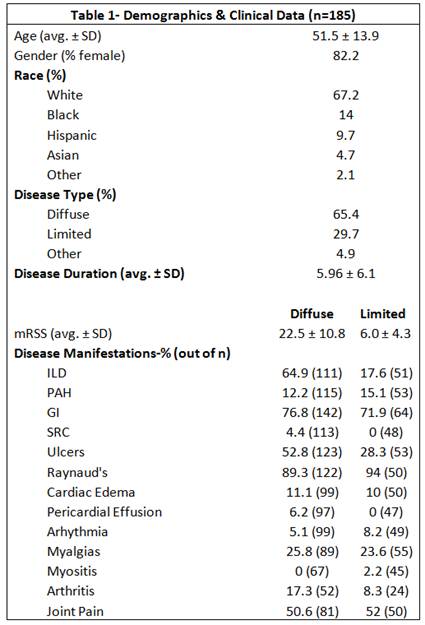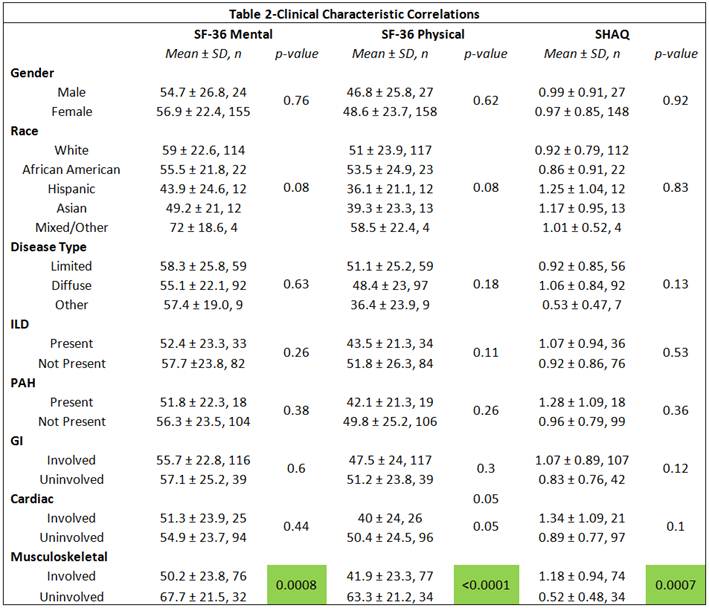Session Information
Date: Tuesday, November 10, 2015
Title: Systemic Sclerosis, Fibrosing Syndromes and Raynaud's - Clinical Aspects and Therapeutics Poster III
Session Type: ACR Poster Session C
Session Time: 9:00AM-11:00AM
Background/Purpose:
Systemic Sclerosis (SSc) is
characterized by a wide variety of symptoms and disease manifestations
including joint pain, gastrointestinal dysfunction, interstitial lung disease,
and cardiomyopathy. Using the Scleroderma Health Assessment Questionnaire
(SHAQ) and Short Form-36 (SF-36) we explored how patient-reported physical
health, mental health, and functional status related to these clinical
characteristics and to cytokine levels in our scleroderma patient cohort.
Methods:
This was an observational study
including 274 patients enrolled in our center’s SSc registry. From those we
included patients who had completed both questionnaires and had clinical data
available (n=185). A subsection of 32 patients was included for cytokine
analysis. Interleukin-6 (IL-6), Interleukin-1β (IL1ß), and Tumor Necrosis
Factor-α (TNFα) levels were measured by Luminex and ELISA assays. Gene
expression of these cytokines was measured by qPCR. Analysis was carried out
using descriptive statistics, Spearman, Kruskal Wallis, and ANOVA tests as
appropriate.
Results:
Musculoskeletal (MSK) involvement,
as defined by the presence of myalgias, myositis, arthritis, and/or joint pain,
correlated with lower (worse) SF-36 scores (χ2=11.32,p<0.01)
and higher (worse) SHAQ scores (χ2=11.54,p<0.01).
High SHAQ scores also correlated with high modified Rodnan Skin Scores (mRSS) (ρ=0.21,p<0.01). SF-36 and SHAQ scores were
also compared to age, gender, race, disease duration, disease type, and other
organ system involvement and no significant interactions were observed. Lower
TNFα expression in peripheral blood mononuclear cells (PBMC) correlated
with MSK involvement (F=103.21,p<0.01) SF-36 Mental Health component scores
positively correlated with IL-6 levels in PBMC (ρ=0.81,p<0.05).
Disease duration negatively correlated with TNFα expression in PBMC (ρ=-0.9,p<0.05). No other significant
interactions were seen between clinical characteristics and cytokine levels.
Conclusion:
In our cohort, MSK involvement was the
only clinical feature to be strongly associated with both decreased quality of
life and worse functional status. Surprisingly, subjects with musculoskeletal
symptoms expressed lower levels of TNFα in their PBMCs. These associations
are topics for further study.
To cite this abstract in AMA style:
Pelrine E, Ah-Kioon MD, Zhang M, Barrat FJ, Spiera RF, Gordon JK. Musculoskeletal Involvement in SSc Correlates with Poor Short Form 36 and SSc Health Assessment Questionnaire Scores As Well As Lower TNF-Alpha Gene Expression in PBMCs [abstract]. Arthritis Rheumatol. 2015; 67 (suppl 10). https://acrabstracts.org/abstract/musculoskeletal-involvement-in-ssc-correlates-with-poor-short-form-36-and-ssc-health-assessment-questionnaire-scores-as-well-as-lower-tnf-alpha-gene-expression-in-pbmcs/. Accessed .« Back to 2015 ACR/ARHP Annual Meeting
ACR Meeting Abstracts - https://acrabstracts.org/abstract/musculoskeletal-involvement-in-ssc-correlates-with-poor-short-form-36-and-ssc-health-assessment-questionnaire-scores-as-well-as-lower-tnf-alpha-gene-expression-in-pbmcs/


